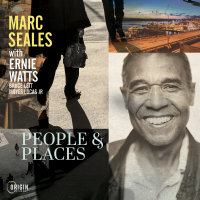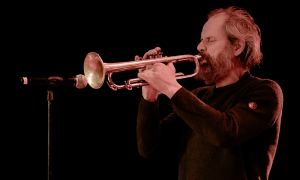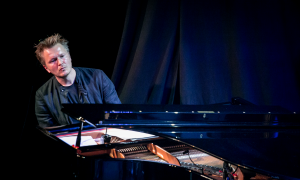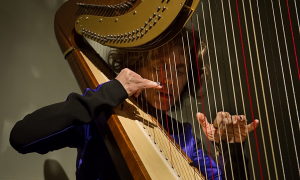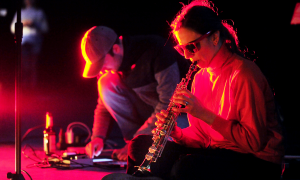Home » Jazz Articles » Festivals Talking » Moers Festival Interviews: M?ster!
Moers Festival Interviews: M?ster!


Kjetil Møster
saxophone, tenorM?ster was born in Bergen, and has lately returned to his home city, following seven years of study in Trondheim, and then another seven years living in Oslo. From outside of Norway it's easy to see him as a recently risen star of extreme jazz music, only really strengthening his international profile during the last seven years or so, since releasing records under his own name, on the Hubro label. Inside Norway, M?ster has had a more established reputation, as a member of The Core (who made

John Coltrane
saxophone1926 - 1967

Pharoah Sanders
saxophone, tenor1940 - 2022

Paal Nilssen-Love
drumsb.1974
Keyboardist
Ståle Storløkken
multi-instrumentalistNikolai Hængsle Eilertsen
bass, electricIt's like unto a Norwegian musical soap opera.
M?ster last played at Moersfest in 2007, with Ultralyd, he thinks...
The most recent M?ster album was States Of Minds, a double LP, if purchased on vinyl. Its central concept moved tectonic slates around improvisational land masses, the band with its collective heads hung down into a heavy, roiling soundsphere that bullied instruments to their unnatural limit, all of them slogging around a truckload of electronic effects, guitars wanting to sound like saxophones, synths wanting to sound like drums, saxophones wanting to sound like distorted, string-bending walls of scuzz. M?ster deliberately seemed to desire subsuming his horn in a cracked verdigris powdering of extra-corporeal noise encrustations, as if trying to disguise its reeded roots. Likewise with his bandmates, all dedicated to a group empathy of sensitised noise-building atmospherics, a soundtrack for oblivion, a set of slow whale-thrash grooves, a hum of minimal intent.
"The band is composed because the ingredients are these people, and their unique expressions," explains M?ster, thinking about what they'll play in Moers. "What they play, it can be improvised, or a groove, or a tune, but the most important is that the sound is made up by these individuals meeting. We usually play some other tunes also. That last album, we'll play that 20 min a-side ["Brainwave Entrainment"], edited together. It has some 'stations,' but the paths between these stations are improvised. The material's very sparse, but it's important to have it there. It's quite a high percentage of improvisation in all the tunes, but some of them are more locked than others. We'd reproduce elements of the improvisation, that happened by coincidence, but it had such a quality that we wanted to preserve it. We had nine days of jams recorded. The previous album was more composed, with tunes, but now I wanted everyone to feel free, and to continue whatever they wanted, to affect the direction of the band."
This time, M?ster wanted it to be much more cooperative, and subject to after-the-event editing. "It worked well, because some things emerged that I don't think I could have directed them to do," he observes. "By letting them step forward, something happened that I would never think of, by myself."
M?ster wanted an epic journey...
"I really like this ambiguity, where you can't tell who does what. I've always been chasing the notion of a flat hierarchy. The saxophonist is not necessarily the one standing in front, and doing all of these fantastic, virtuoso solos. I want to take away that focus on this soloist instrument."
M?ster's early years involved being a multi-instrumentalist. "When I was a kid, I played everything, all of the time. My main instruments were electric bass and saxophone. I studied in high school, and thought, in my sixteen-year-old brain, that bass was more of a rock thing, that I didn't need to study. Saxophone is more of an instrument that you have to study. I wasn't too happy about the choice for a couple of years. I was very late starting with jazz."
Tenor saxophone is M?ster's primary horn, but he also plays soprano, as well as clarinet and bass clarinet. He benefited from a particular jazz epiphany during his experience with the emerging Trondheim Jazzorkester. M?ster made his debut with that organisation in a significant year, 2000, when they worked together with

Chick Corea
piano1941 - 2021
The beginning of the actual M?ster quintet sprang out of a specific commission for the 2010 Kongsberg festival. At this time, M?ster was spending much time with Datarock, ending up being with them for five years, rather than the one that he'd envisioned. There was the feeling in Kongsberg that he should be pulled back towards weirdo jazz. M?ster agreed that he wanted to combine his experimental jazz with his prog rock and electronic influences.
Leaping forward to 2019, M?ster can be heard to great effect on the new

Gard Nilssen
drumsb.1983
The disc smoulders with a tangible harnessing of that gig's supreme precision energy.
M?ster does still have the time for 'outside' band involvements. He's working with The End, and with an acoustic trio that features London bassman John Edwards. M?ster also creates his own solo electroacoustic work. The core activity is always M?ster!, though. "The new album that we just recorded in January, the opening piece is a 14 minute saxophone solo," he laughs, contradicting the earlier saxophonic modesty. "That's the complete opposite again! That felt natural, for that piece. This album is a lot more controlled. I took a lot of time analysing the previous album, writing it out and filtering it: all the ideas are taken from that States Of Minds album, that we created together."
The way he describes it, there was a technique of micro-transcribing, homing in on certain compelling instances on the 2LP set, with M?ster utilising them as grist for compositional starting points. "That's the forum where I can get out my blend of jazz, experimental, prog and electronic music, basically. It's a good place to try out lots of things."
The new album is set for release on the Hubro label, of course...
Photograph: Vossa Jazz
Tags
Comments
About M?ster
Instrument: Band / ensemble / orchestra
PREVIOUS / NEXT
Support All About Jazz
 All About Jazz has been a pillar of jazz since 1995, championing it as an art form and, more importantly, supporting the musicians who make it. Our enduring commitment has made "AAJ" one of the most culturally important websites of its kind, read by hundreds of thousands of fans, musicians and industry figures every month.
All About Jazz has been a pillar of jazz since 1995, championing it as an art form and, more importantly, supporting the musicians who make it. Our enduring commitment has made "AAJ" one of the most culturally important websites of its kind, read by hundreds of thousands of fans, musicians and industry figures every month.
Go Ad Free!
To maintain our platform while developing new means to foster jazz discovery and connectivity, we need your help. You can become a sustaining member for as little as $20 and in return, we'll immediately hide those pesky ads plus provide access to future articles for a full year. This winning combination vastly improves your AAJ experience and allow us to vigorously build on the pioneering work we first started in 1995. So enjoy an ad-free AAJ experience and help us remain a positive beacon for jazz by making a donation today.

Dusseldorf
Concert Guide | Venue Guide | Local Businesses
| More...







 Buy Now
Buy Now





